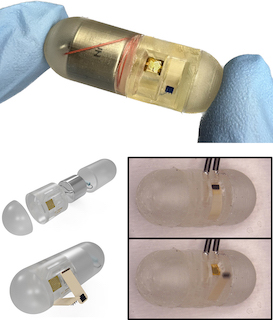New features on ingestible capsule will deliver targeted drugs to better treat IBD, Crohn’s disease

The newest version of an ingestible capsule being developed by the University of Maryland (UMD) MEMS Sensors and Actuators Laboratory (MSAL) appears in the Aug. 16, 2024 issue of Device, a Cell Press journal. “Magnetically triggered ingestible capsule for localized microneedle drug delivery” describes a remotely triggerable local drug injection system for the gastrointestinal (GI) tract. Although not yet available to the medical community, this advance points to the day clinicians could use an ingestible capsule to better treat intestinal diseases. The capsule can be directly controlled with external magnets, using dissolvable microneedles that provide adaptable, efficient, fast, localized drug delivery.
Materials Science and Engineering Ph.D. student Joshua Levy is the first author. In early June 2024, he won the Janusz Bryzek Abundance through MEMS Award at the Workshop on Solid-State Sensors, Actuators, and Microsystems (aka the Hilton Head Workshop) for related work. Other authors include Fischell Department of Bioengineering graduate student Michael Straker, 2024 Electrical and Computer Engineering Ph.D. recipient Justin Stine, UMD Research Associate Luke Beardslee (ISR) and Herbert Rabin Distinguished Chair in Engineering, Professor Reza Ghodssi (ECE/ISR). Levy, Straker, Stine, and Ghodssi are also affiliated with the Robert E. Fischell Institute for Biomedical Devices. Dr. Ghodssi is the advisor to Levy, Straker, and Stine.
More information can be found on UMD ECE News. (2 - July / 2024)